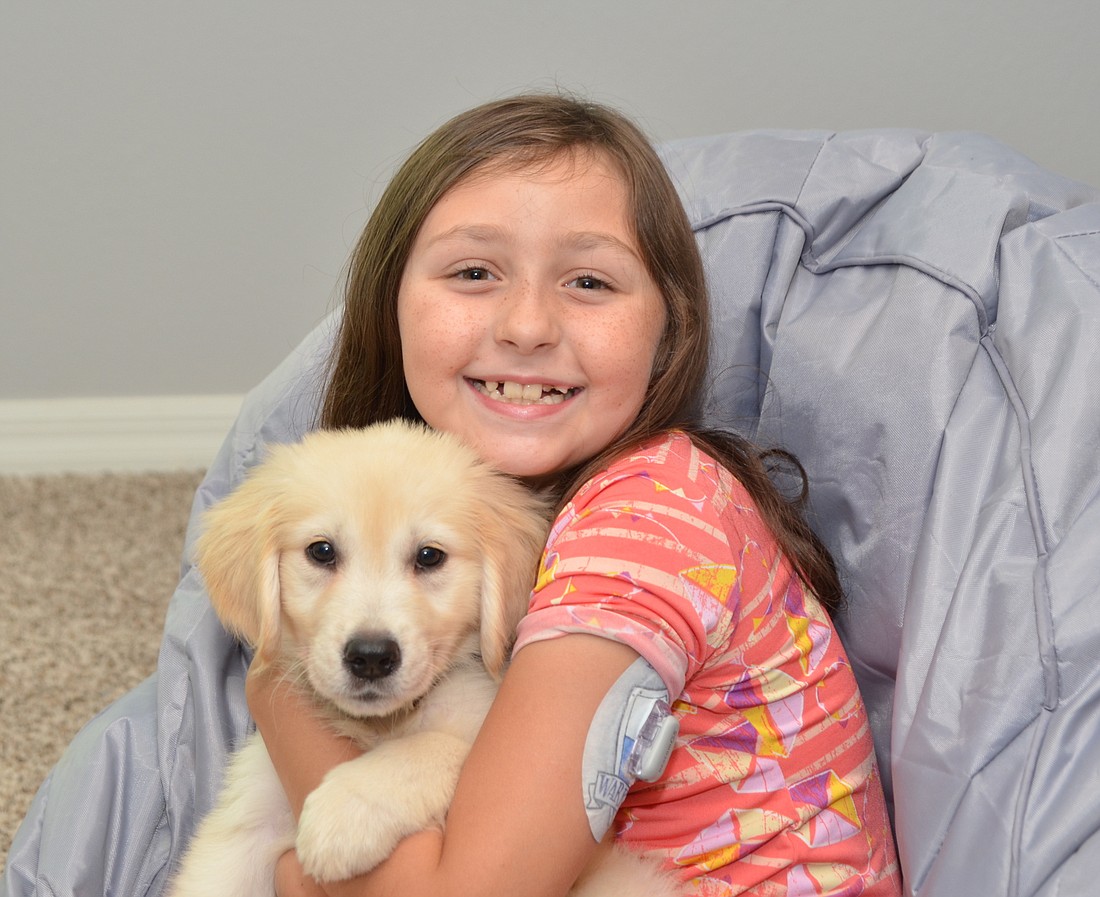- April 25, 2024
-
-
Loading

Loading

At nearly 4 months old, Loki is all over the place, nipping at fingers and toes and exploring his new surroundings. But once the golden retriever is trained as a diabetes alert dog, his role in the Bertsch household will become an important one.
Scarlett Bertsch, 9, was diagnosed with Type 1 diabetes in 2017; she has a continuous glucose-monitoring system on her left arm and an insulin pump on her right. She sleeps with a monitor at night, and an alarm goes off when her blood-sugar level goes too high or too low. It’s dangerous, though, when her parents, George and Kim Bertsch, of Oakland, sleep through the alarm — especially when Scarlett’s blood sugar is 500 instead of the normal 120.
DIABETES DIAGNOSIS
Kim Bertsch took Scarlett to the doctor when her daughter came home from school nearly two years ago and her face looked ashen. That coupled with a continual thirst and need to use the restroom concerned the parents.
Bertsch’s husband is diabetic, so they were aware of the signs.
The diagnosis of diabetic ketoacidosis was confirmed at the hospital, and she immediately was admitted and placed in the intensive-care unit.
“It was scary,” Bertsch said. “She was like, ‘Am I going to die?’ We knew she was going to be OK. (Doctors) said, ‘You’re lucky; this is going to be a short hospital visit because you caught it in time.’”
It took Scarlett longer to accept the test results.
“I was hoping I wasn’t going to be diagnosed because it would be hard to eat,” Scarlett said. “I thought I would never be able to eat what I want. I used to grab Cheez-Its or Goldfish and sit on the couch and eat.”
Bertsch keeps 15-carbohydrate snacks and juice boxes at home and with her at all times in case Scarlett’s sugar goes below 80.
“It can be crackers, juice; a fun size of Skittles is a 15-carb pack,” Bertsch said. “She does well with it, but sometimes she’s like, ‘Why can’t I eat a cookie right now?’ She can have cookies, but if her sugar is high, we have to wait a few hours. She can’t just decide she wants to eat a cookie.”
It’s tough to be 9 and want a cookie but not be allowed to eat one. It’s tough to attend a birthday party and not be able to have cake and ice cream.
Scarlett was diagnosed nearly two years ago, and her sugars still haven’t been regulated, Bertsch said. Because of the extreme nighttime fluctuations, they decided to look into getting an alert dog for their daughter.
They went to a local pet shop last month to test the temperaments of various breeds, including the golden retriever.
“(Loki) was a good candidate,” Bertsch said. “He was sniffing her Dexcom and was really interested in her. He wasn’t trying to bite her Dexcom. The others were chewing her shoes. We … put food under one bowl and not the other. For him, he went to the right bowl both times. The others weren’t using their sniffing abilities. And she had cookies in her pocket and he was trying to get it the whole time. Food modification is a big thing for service dogs.”
So Loki went home with the Bertsches.
LOKI’S ROLE
The golden, named for the Marvel Comics character, is learning how to live with his new family. Scarlett said he likes watching funny puppy videos.
Every five minutes, Scarlett’s DexCom on her arm draws her blood and tests it and sends the results to an app on her phone. Her parents receive the notification, too.
“Sometimes I’m too far from the receiver, my phone,” Scarlett said. “When it says ‘signal lost,’ the dog will either bark or put his paw on you.”
The Bertsches have been working on simple commands at home. Loki went recently to the Winter Garden Farmers Market, and leash training is going well, Bertsch said.
After his next round of shots, Loki will begin obedience training, followed by further training to become a diabetic alert service dog.
Bertsch said they have the money for obedience school but the extensive training will cost up to $7,000. Friends set up a fundraising page on Facebook — Scarlett’s Diabetic Alert Dog Fundraiser — with a goal of $4,000.
The family is inching closer to that goal, and Bertsch said they are grateful for all the donations that have been made so their daughter can live a more stable life.